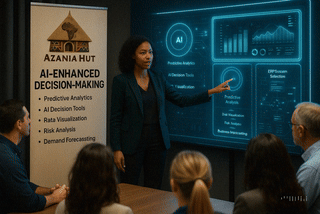
AI Transformation & Automation
We help organisations harness the power of artificial intelligence to work smarter, faster, and more strategically. Our training programs build confidence, enable change, and show leaders how to embed AI into everyday processes and decision-making — while ensuring governance, ethics, and risk management remain at the core.



AI Training & Change Enablement


Help teams adopt new AI workflows and redefine roles/responsibilities
Executive training on AI strategy, governance and use case design
Role-based AI enablement (e.g., HR, Finance, Legal)
Training on using tools like Microsoft Copilot, ChatGPT, Notion AI, etc.
Workshops on responsible AI, bias, fairness, and transparency


Evaluate the organisation’s data, infrastructure, processes, and culture
Presentations and workshops for leadership to align vision and risk appetite
AI Quick Start (5 Weeks)
Identify and rank high-impact areas for AI (e.g., customer service, ops, finance)
Create a 12 - 36 month AI transformation roadmap aligned to business goals



Identify automation candidates via business process analysis (e.g., RPA, AI, workflows)
Implement tools with embedded AI
Use Microsoft Copilot, ChatGPT, or custom GPTs to automate writing, reporting, analysis
Build end-to-end intelligent workflows (e.g., approvals, triggers, escalations)
Define and track ROI of automation efforts (cost/time saved, errors reduced)
AI-in-Process Package


AI Enhanced Decision-Making
Apply AI models to forecast trends, customer churn, operational delays, etc.
Design dashboards that integrate ML predictions and automation triggers
Automate reading, summarising, and classifying large documents (using AI Tools)
Analyse emails, surveys, and feedback using AI Tools
Deploy AI tools into existing MS Teams, SharePoint, or CRM environments





